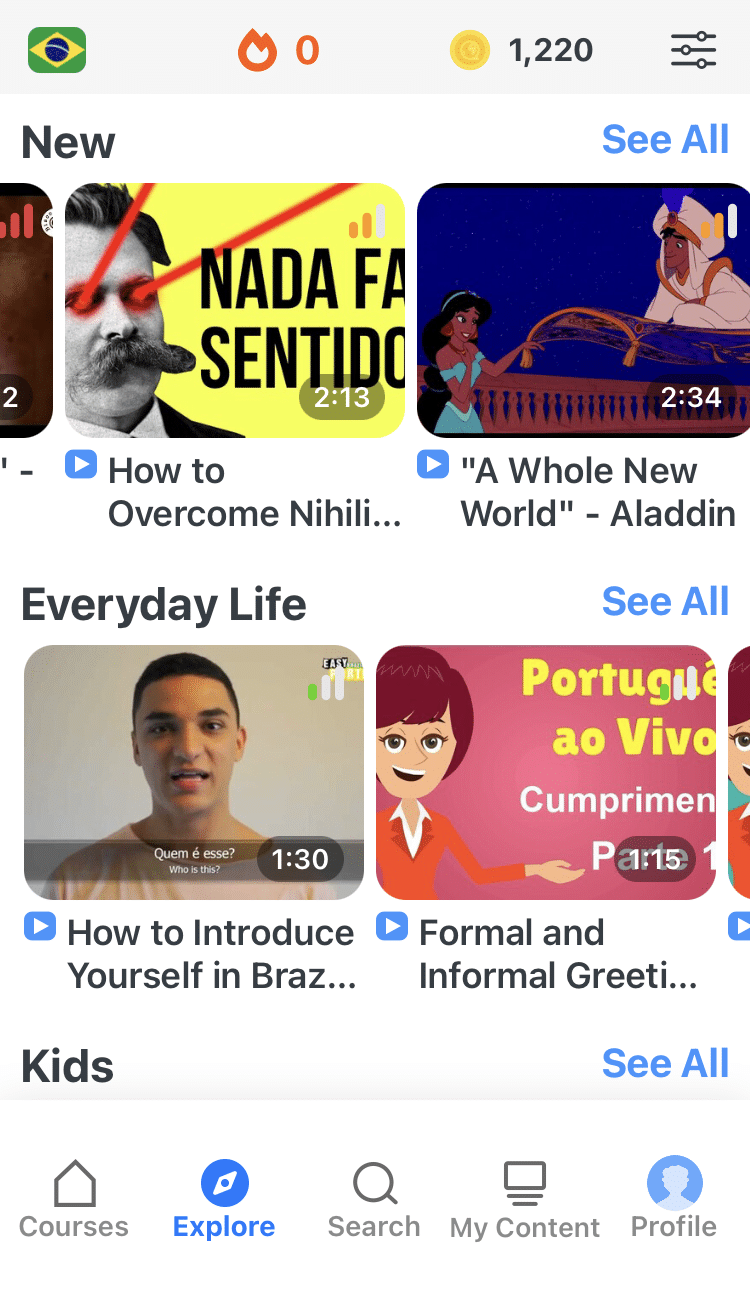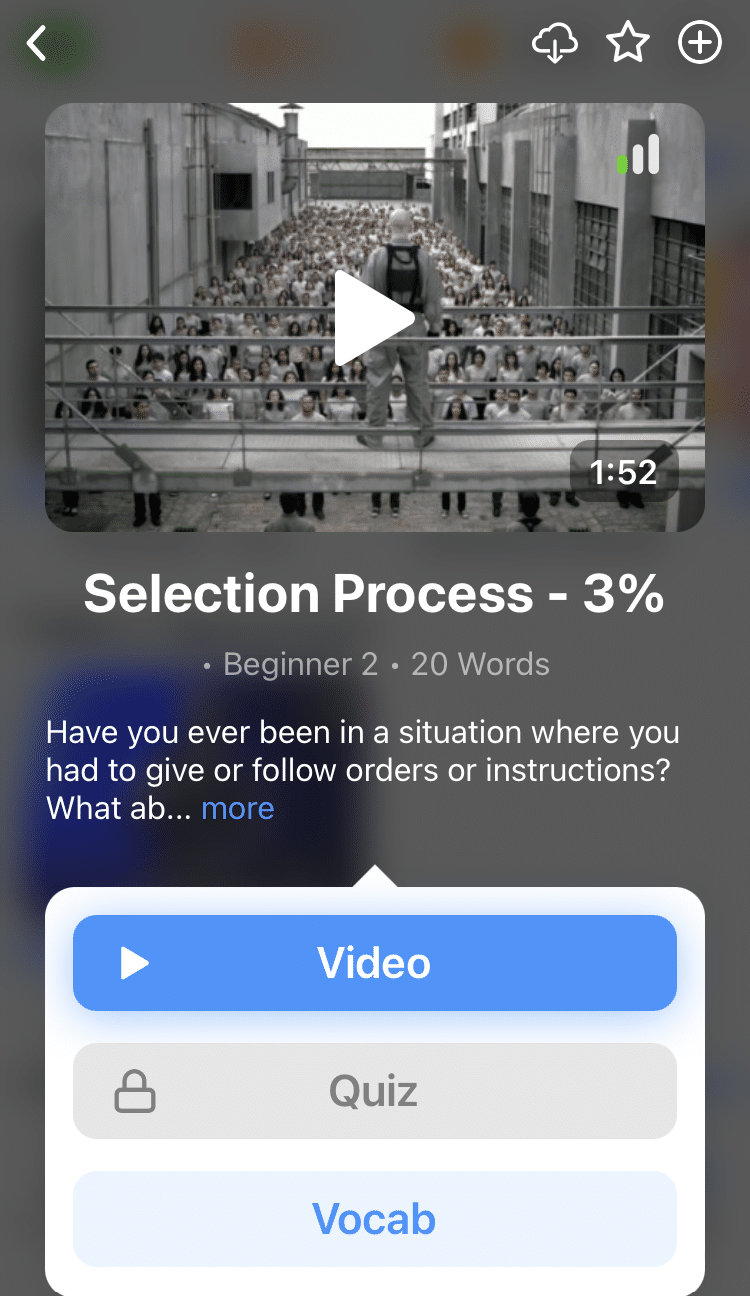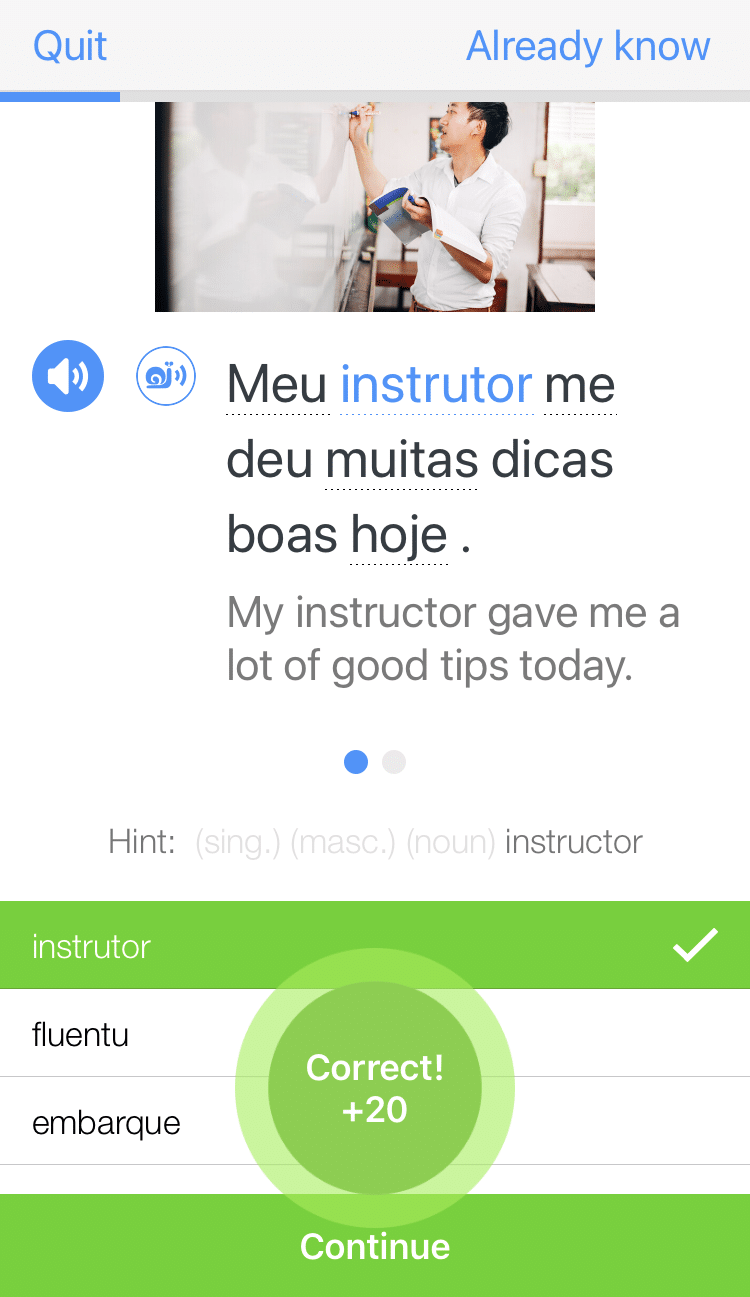
30 Common Brazilian Slang Words to Understand the Locals
If you plan to visit Brazil, you’ll need to interact with the locals.
You’ll also be exposed to a lot of Brazilian slang words and colloquialisms that sound completely nonsensical to the untrained ear.
Here, I’ll teach you 30 Brazilian slang words accompanied by audio pronunciation and example sentences to help you sound like a native speaker!
Note that slang can significantly vary from region to region in Brazil, but these are most commonly used in São Paulo.
Contents
- Brazilian Slang for Expressing Yourself
- Brazilian Slang for Talking About People
- Brazilian Slang Verbs
- Brazilian Internet Slang
- How to Learn Brazilian Slang
- And One More Thing…
Download: This blog post is available as a convenient and portable PDF that you can take anywhere. Click here to get a copy. (Download)
Brazilian Slang for Expressing Yourself
1. E aí?
E aí? is quite a colloquial way of saying “hi.” It’s pretty much like saying “what’s up?” in English.
For example:
E aí pessoal?
What’s up guys?
2. Bacana
The word bacana means “good,” “cool” or “awesome.” You might hear someone exclaim Que bacana! (That’s awesome!) when they hear about your latest Brazilian travel plans.
It’s generally used by Brazilians to describe something cool they’ve encountered recently.
For example:
Esse projeto é muito bacana.
This is a really cool project.
3. Tá bom?
A loose translation for tá bom? is “all good?” It’s a way of asking if someone agrees or is okay with a proposition.
We’ve used the exclamation form here, but tá bom can also be used as an affirmation—to express that you agree with something.
It’s also quite common to leave the word bom (good) out completely and just use tá .
For example:
Amanhã a gente conversa sobre isso, tá bom?
We’ll talk about it tomorrow, okay?
Tá.
All right.
4. Beleza
In a literal sense, beleza means “beauty” but in colloquial speech it’s commonly used to show agreement.
Occasionally, you might hear someone sarcastically utter Que beleza (wonderful) to express disdain about something they’ve seen or experienced—but for the most part, beleza is a positive term.
For example:
Vamos ao cinema amanhã?
Do you want to go the cinema tomorrow?
Beleza, te encontro às 5h.
Okay, I’ll meet you at 5 p.m.
5. Joia
Another way of showing agreement. The literal translation for joia is “jewel” but Brazilians use it to express that they’re on board with something (the same as with beleza) or to tell someone that they’re well.
For example:
Tudo bem?
How are you?
Tudo joia!
I’m great!
6. Legal
Brazilians say legal to mean “good,” “great” or “cool.” It’s one of the most common slang terms and you’ll hear it quite often!
For example:
Nossa, esse filme foi legal! Vamos assistir outro?
Wow, that movie was cool! Let’s watch another one?
7. Falou
Falou comes from the past tense of the verb falar (to talk or to say).
As a slang word, falou is used in a similar manner to tá bom —it’s a way of saying “okay,” in both an interrogative manner and as an affirmation.
Again, we’ll provide a few examples for this one.
For example:
Amanhã eu te passo os detalhes, falou?
I’ll send you the details tomorrow, all right?
Te vejo no sábado às 10h.
I’ll see you on Saturday at 10 a.m.
Falou, até lá.
Okay, see you then.
8. Valeu
This is one of the most popular slang words in Brazil. Valeu comes from the past tense of the verb valer (to be worth something). Colloquially, valeu is commonly used in many different situations to say thanks in place of obrigado / obrigada (thanks).
For example:
Aqui está.
Here you go.
Valeu!
Thanks!
9. Caô
Use the word caô when you want to say something is a lie or exaggeration.
For example:
Isso é caô, não acredito!
That’s a lie, I don’t believe it!
10. Na boa / De boa
Na boa means “no problem” or “it’s all good.”
De boa is very similar. It means “no worries” or “chill.” But you can also use it to say you’re “chill” (at ease) with something.
For example:
Na boa, não precisa se desculpar, eu entendi o seu ponto de vista.
No worries, you don’t need to apologize, I understood your point of view.
Estou de boa aqui, pode ir na festa sem mim.
I’m chill here, you can go to the party without me.
Brazilian Slang for Talking About People
11. Mina
Mina refers to a young woman. It’s often used the same way we use “chick” in English.
For example:
Aquela mina é muito inteligente.
That chick is really smart.
12. Parça
Parça is a shortened version of parceiro, which means “partner.” You’d use this slang word to talk about your close friends. In English, it would mean something like your “buddy” or “homie.”
For example:
Ele não é só um amigo, é um parça.
He’s not just a friend, he’s a buddy.
13. Zica
Zica typically means “bad” or “unfortunate.” But in slang, it’s used to describe someone who’s very good at something.
For example:
Ele é zica no futebol.
He’s awesome at soccer.
14. Cara
Cara is colloquially used to mean “face,” but it’s also slang used to talk about a guy or a man.
We’ll provide a few examples that showcase both senses.
For example:
Esse cara é louco.
This guy’s crazy.
Ela me deu um tapa na cara.
She slapped me in the face.
Cara, a prova foi muito difícil.
Man, that test was really hard.
15. Gato / Gata
For the unprepared, hearing someone described as a “cat” (gato) might sound a little weird. But in Brazil, that’s how people describe someone who’s “hot” or good-looking.
For example:
O ator principal dessa novela é um gato.
The leading man in this TV soap is very attractive.
(Cultural tip: Brazilian soaps/TV dramas are very popular both locally and abroad. You should definitely take a look at few if you want to learn about what makes the society tick. And to hear some of the colloquial language we’ve mentioned thus far being put into good use).
16. Cabeça-dura
Literally a “hard-head,” cabeça-dura is a phrase that describes someone who’s very stubborn or stuck in their ways.
For example:
João é um cabeça-dura, ele nunca vai mudar.
João is very stubborn, he’ll never change.
17. Pão-duro
In Brazilian Portuguese someone who’s a “hard-bread” (pão-duro) is a miserly scrooge—in other words, a very frugal and stingy person.
For example:
Esse cara é um pão-duro.
This guy’s a scrooge.
18. Figura
Figura means “figure” literally. But in slang, it’s used to describe someone who has a big personality. For example, someone funny or who is known for their character and mannerisms that stick out.
For example:
Meu tio é uma figura!
My uncle is such a character!
19. Zé
Zé is short for the name José. When you say someone is a zé, you’re saying they’re an “average Joe.” It can have derogatory inclinations though, so be careful when using it.
For example:
Não seja um Zé Ninguém.
Don’t be a nobody.
20. Véio / Véia
This is an informal way to refer to an old man or old lady. But it’s not derogatory—it actually has affectionate implications.
Véio (only the masculine version) can also be used the same way as cara (man) in interjections.
For example:
Meu véio é muito sábio.
My old man is very wise.
Véio, choveu demais hoje!
Man, it rained a lot today!
21. Mala
Someone who is a mala is a pain or a burden. You can use this to describe someone who is annoying to be around or bothers you a lot.
It literally means “suitcase,” so think of it as describing someone as “baggage.”
For example:
Ele é um mala sem alça.
He’s a real pain to deal with.
22. Fulano e Beltrano / Fulano e Sicrano
These phrases are the Brazilian Portuguese equivalents to “so-so” or “what’s-his-name.”
You can use it when you’re talking about someone whose name you can’t remember, or to imply that they aren’t relevant or important.
For example:
Fulano e Beltrano foram lá ontem.
So-and-so went there yesterday.
Brazilian Slang Verbs
23. Vacilar
Literally, Vacilar means “to hesitate.” But in slang, it means “to mess up.”
For example:
Ele vacilou comigo.
(He messed up with me.)
24. Mandar-se
A colloquial verb that’s best translated as “to get out.”
It can be used in an imperative manner (as in, to command someone to leave) or in a descriptive sense to talk about your own pursuits of leaving a place where you don’t want to be.
For example:
Se manda daqui!
Get out of here!
Vou me mandar para as ilhas do Caribe nesse inverno.
I’m setting off for the Caribbean islands this winter.
Esse lugar é muito perigoso, vou me mandar daqui.
This is a really dangerous place, I’m getting out of here.
25. Rolar
You might be able to guess the literal meaning of this one: rolar is the infinitive of the verb “to roll.” But it’s not used in the same way as the English-language “let’s roll.” Rather, Brazilians use rolar to talk about an event—in the past, present or future.
For example:
Vai rolar uma festa na casa do Lucas amanhã.
There’s going to be a party at Lucas’ place tomorrow
Rola um churrasco esse fim de semana?
Shall we have a barbecue over the weekend?
26. Topar
This is quite a straightforward one to learn: topar is a colloquial verb that means “to agree” or “to accept” to do something.
For example:
Ele topou me ajudar com o meu dever de casa.
He agreed to help me with my homework.
27. Pisar na bola
Literally translated as “stepping on the ball,” pisar na bola describes a situation when someone messes up, makes a mistake or lets someone down.
For example:
Sua irmã pisou na bola feio comigo.
Your sister really let me down.
Se você pisar na bola de novo, está fora do time.
If you mess up once again, you’re off the team.
Brazilian Internet Slang
28. Rsrs
This slang word is equivalent to “lol” (laugh out loud) in English, and it’s used the same way. It’s an abbreviation of the word Risadas (laughter).
So if your Brazilian friend sends you a funny video, you can respond with Rsrs.
Brazilians add more “rs” to show that they found something really funny.
So if the video was extra funny, you can say “Rsrsrsrs.”
29. Pq
Pq is an abbreviation of porque (why) and is commonly used in texts.
For example:
Fui ao cinema sozinho pq meu amigo não pôde ir.
(I went to the movies alone because my friend couldn’t go.)
30. Tbm / Tb
These letters are abbreviations of the Portuguese word também, which means “too” or “also.” Once again, this is commonly used in text conversations.
For example:
Eu tbm fui ao cinema na semana passada.
(I also went to the movies last week.)
How to Learn Brazilian Slang
There are so many ways to learn Brazilian slang, from apps and online resources to language exchanges.
- Google and YouTube are both great resources for learning slang. Simply look for authentic Brazilian content. Intermediate to advanced speakers can also consult the Dicionário inFormal to get new leads on colloquialisms—just keep in mind that all definitions provided are in Portuguese. Here’s a great YouTube video from the FluentU Portuguese channel to start:
- Once you’ve compiled a list of slang terms, enter each new term into your preferred dictionary app to check its meaning and click the audio button to hear how it’s pronounced. That’s your cue to repeat the words to yourself a few times so you can get the pronunciation right.
 As you gain more confidence with your newly acquired lingo, you’ll want to start incorporating it into real-life exchanges. You don’t have to go all the way to Brazil to do this: Finding someone to talk to can be as easy as going to Brazilian Portuguese language exchange Meetups in your area or signing up for an online language partner service like Tandem or HelloTalk.
As you gain more confidence with your newly acquired lingo, you’ll want to start incorporating it into real-life exchanges. You don’t have to go all the way to Brazil to do this: Finding someone to talk to can be as easy as going to Brazilian Portuguese language exchange Meetups in your area or signing up for an online language partner service like Tandem or HelloTalk.- Immerse yourself in Portuguese content and pick up new slang in context using an online immersion program like FluentU. This program uses short video clips from authentic Portuguese media to teach the language as it’s really used by native speakers.
The more vocabulary words you learn, colloquial or otherwise, the easier it’ll be to form patterns and sentences like a native Brazilian speaker.
So go forth, keep practicing and don’t forget to put all these great phrases to good use with your other study materials.
Boa sorte! (Good luck!)
Download: This blog post is available as a convenient and portable PDF that you can take anywhere. Click here to get a copy. (Download)
And One More Thing…
If you've made it this far that means you probably enjoy learning Portuguese with engaging material and will then love FluentU.
FluentU takes authentic videos—like music videos, movie trailers, news and inspiring talks—and turns them into personalized Portuguese lessons.
Other sites use scripted content. FluentU uses a natural approach that helps you ease into the Portuguese language and culture over time. You’ll learn Portuguese as it’s actually spoken by real people.
FluentU has a wide variety of videos, as you can see here:

FluentU brings native videos within reach with interactive transcripts. You can tap on any word to look it up instantly. Every definition has examples that have been written to help you understand how the word is used. If you see an interesting word you don’t know, you can add it to a vocab list.

Review a complete interactive transcript under the Dialogue tab, and find words and phrases listed under Vocab.

Learn all the vocabulary in any video with FluentU’s robust learning engine. Swipe left or right to see more examples of the word you’re on.

The best part is that FluentU keeps track of the vocabulary that you’re learning, and gives you extra practice with difficult words. It'll even remind you when it’s time to review what you’ve learned. Every learner has a truly personalized experience, even if they’re learning with the same video.
You can try FluentU for free for 2 weeks. Click here to check out the website or download the iOS app or Android app.




